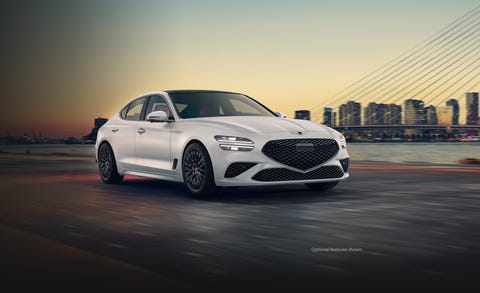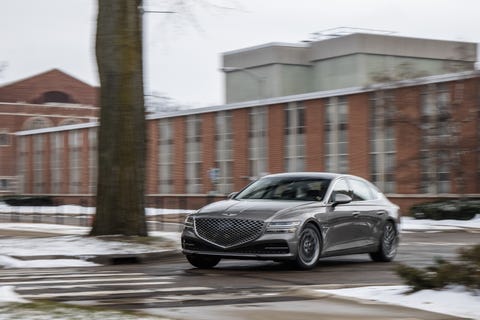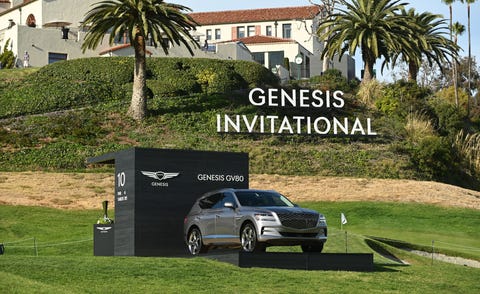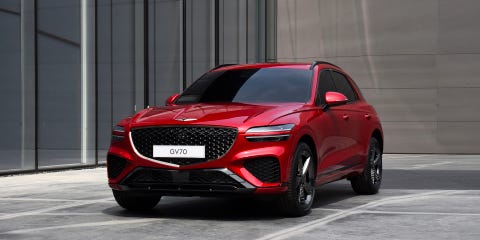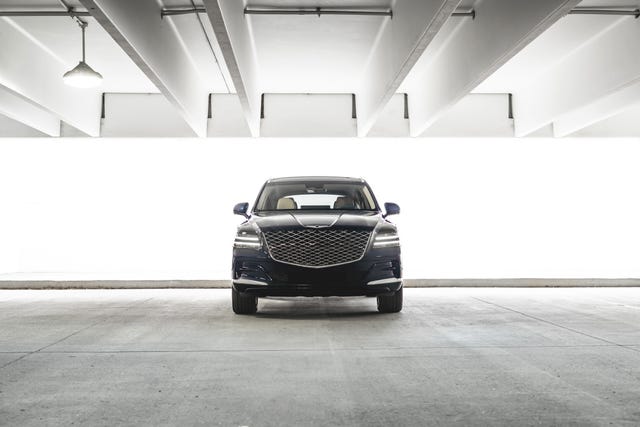
Marc UrbanoCar and Driver
- The Genesis brand had a troubled launch in the United States and has suffered from low sales despite offering good cars and a value proposition compared to other luxury brands.
- With one SUV (the GV80) in showrooms and another (the GV70) on the way soon, the company finally has a full model lineup to help bring customers in the door.
- Despite promising a new take on luxury, the company is using familiar marketing strategies to reach monied buyers, and anecdotes suggest the brand is getting better at poaching German luxury customers.
When Eric Benson, the general manager of a Genesis dealership in Bend, Oregon, took the multi-award-winning Genesis G70 to a trade show last year, potential clients guessed that the car was an Alfa Romeo, a Bentley, a Jaguar—anything but a Korean luxury sport sedan.
Benson’s experience was familiar to us; we recently spent 40,000 miles with a G70 of our own. Everywhere we went, we encountered people who were intrigued by the car but had never heard of the company that built it. That could finally be changing.
Genesis’ sales were up 75 percent in the first two months of this year compared to the first two months of last year, almost entirely thanks to the success of the brand’s first SUV, the GV80. And, awkwardly, the recent high-profile crash suffered (and survived) by Tiger Woods in a GV80 may have helped finally make Genesis a household name.
It’s been a long road to name recognition. The grain of sand that would eventually form the pearl of the Genesis brand was a Hyundai-badged rear-drive sedan, introduced to the U.S. market in 2008. It took almost a decade for that single car to turn into luxury brand with two models—the G80, a mid-size sedan, was based on the Hyundai Genesis. The G90, a large sedan, was a rebadged Hyundai Equus. But a two-car lineup isn’t enough to make a car company.
For the first few years of its life, Genesis was plagued by problems with its dealer network. In mid-2017, a few months into Genesis’s launch as Hyundai’s luxury brand, the company was forced to stop selling cars in Louisiana after the state’s Motor Vehicle Commission alerted the Hyundai to the fact that company was not properly licensed to sell, service, or market Genesis vehicles in the state. In 2018, the company stopped importing cars from Korea for several months. Hyundai had decided mid-launch that it would require Genesis dealers to be separate from Hyundai dealers, leaving the brand without any place to sell their new cars while dealers ramped up standalone operations. Hyundai was eventually sued by a smattering of dealers who said they had shelled out thousands to upgrade their facilities for Genesis cars only to be told that they would be allowed to show the cars after all.
Executives said it was all part of a plan, but sales were off even the brand’s low targets. When the company stopped importing cars for that stretch in 2018, sales had fallen by 50 percent compared to the previous year, and pausing imports was one way to deplete inventory in preparation for the launch of the 2019 G70, Genesis’ 3-series fighter. The company hoped 2020 would be its breakout year, and commissioned a Super Bowl commercial to herald the arrival of its first SUV, but the pandemic delayed the launch of the GV80 and the redesigned G90 by months.
But after years of lackluster sales and limited public awareness, Genesis’s plans are starting to fall into place. Stephanie Brinley, an analyst at IHS Markit, says that though some of the brand’s early strategies fell flat, Genesis has always been playing the long game. “[Hyundai executives] were talking five, ten years to get the brand to where they were going to be minimally happy with its performance,” Brinley told us. “They’ve made plenty of changes to the tactics, but through Covid, through the dealership problems that they had … they’ve remained committed.”
Now that Genesis has a full model line with three sedans, an SUV, and a compact crossover on the way, customers are finding their way to showrooms. Peter Lanzavecchia, president of the Genesis National Dealer Advisory Council, told Automotive News that he thinks sales could triple in 2021. Shawn Treadway, sales manager at Genesis of Southfield and Glassman Hyundai in southeast Michigan, says he can’t keep GV80s in stock.
“We have 15 of them arriving between now and June, all of them are sold,” he says. And that hasn’t been a deterrent to others. People are “willing to wait as long as it takes to get one,” Treadway says. He is also seeing more customers turn in German luxury cars for a new Genesis. Before the launch of the GV80 and redesigned G90, most conquests were from American luxury marques like Cadillac and Lincoln.
That new awareness could be thanks to Genesis’ readiness to use marketing strategies that put its cars in front of traditional luxury customers. Last year’s Super Bowl commercial is one example. The Genesis Invitational, a stop on the 2021 PGA tour, is another. “It’s a combination of getting out and having people see celebrities drive it and just being out and around those people that you would expect would be able to afford it,” Brinley says of sponsoring golf tournaments, a favorite practice of Mercedes-Benz.
Of course, no one would have anticipated that sponsoring a golf tournament would catapult Genesis’ name into push notifications when a GV80 courtesy car driven by tournament host Tiger Woods crashed on a curvy stretch of road in southern California on February 23. Grisly crash photos and the fact that Woods escaped with serious but apparently not life-threatening injuries may have helped cement Genesis’ focus on safety in customers’ minds. In the two days after the crash, traffic to Car and Driver‘s GV80 page was up more than 850 percent versus the previous week.
Benson says GV80 sales skyrocketed in the week after Woods’ accident, with some business from customers who were hearing about the brand for the first time. “We more than doubled our month in that last week” of February he says, which propelled Genesis of Bend to its best sales month ever. When we talked to him in mid-March, interest was still high.
Even before the GV80 was a factoid in a major news story, the fledgling brand’s first utility vehicle was drawing customers into showrooms. The brand’s biggest problem now may be that the GV80 is responsible for so much of the brand’s current success. At Shawn Treadway’s dealership, when customers come in for a GV80 but aren’t willing to wait, they’re more likely to shift to a Hyundai Palisade than another Genesis, the rest of which are sedans. Benson estimated that 90 percent of his customers were looking for a GV80, and even the availability of all-wheel drive doesn’t tempt buyers in his snowy market to the brand’s sedans. But if the launch this summer of the compact crossover GV70 goes as planned, the GV80 won’t have to shoulder the burden alone for long.
This content is created and maintained by a third party, and imported onto this page to help users provide their email addresses. You may be able to find more information about this and similar content at piano.io

